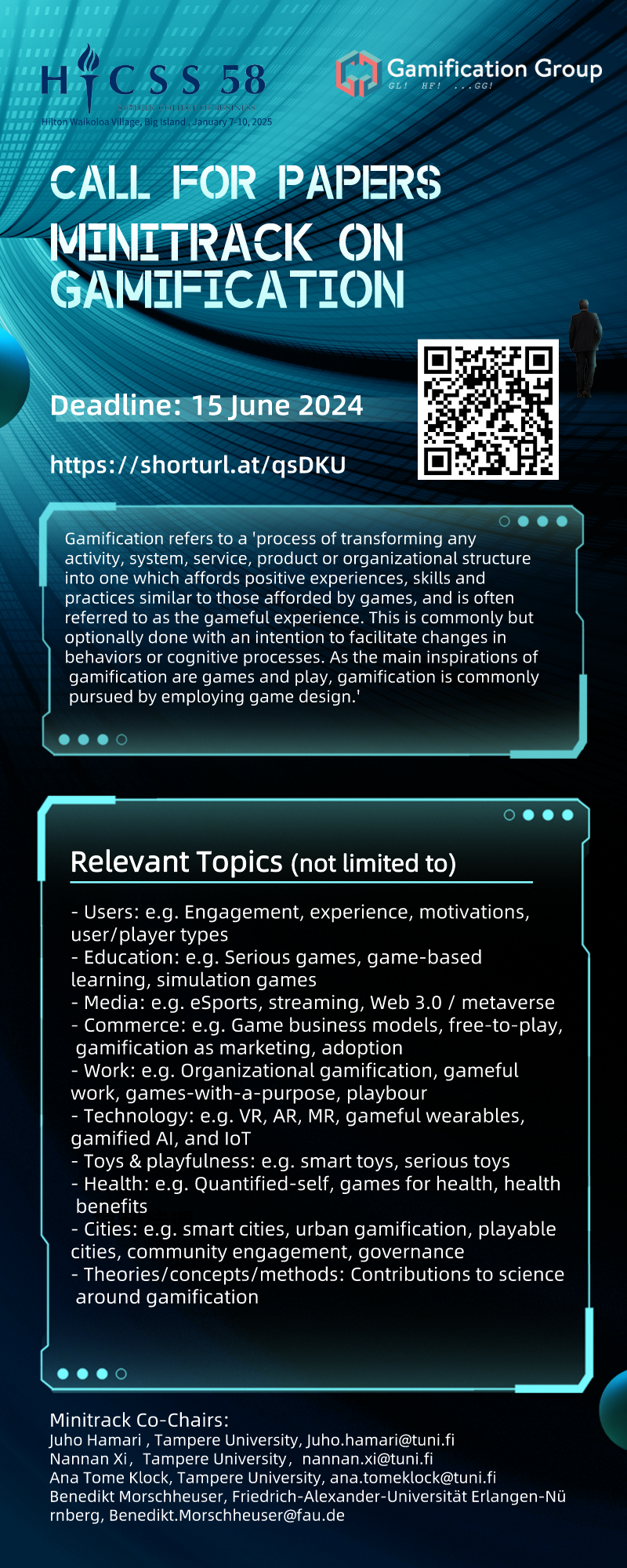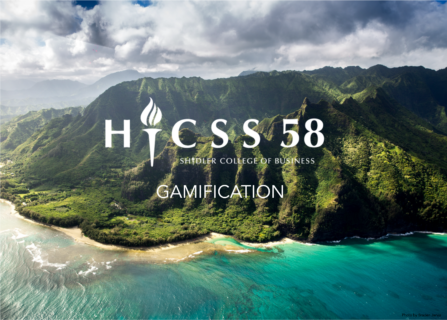Call for Papers: Gamification Minitrack at the 58th Hawaii International Conference on System Science
We are happy to announce that Juho Hamari, Nannan Xi, and Ana Tome Klock from the Gamification Group, and Benedikt Morschheuser from our research group will organise the Gamification minitrack at the Hawaii International Conference on System Sciences, HICSS in January 2025, Hilton Waikoloa Village, Big island.
Gamification refers to a “ process of transforming any activity, system, service, product or organizational structure into one which affords positive experiences, skills and practices similar to those afforded by games, and is often referred to as the gameful experience. This is commonly but optionally done with an intention to facilitate changes in behaviors or cognitive processes. As the main inspirations of gamification are games and play, gamification is commonly pursued by employing game design.”
Gamification has become an umbrella concept that, to varying degrees, includes and encompasses other related technological developments such as serious games, game-based learning, exergames & quantified-self, games with a purpose/human- based computation games, and persuasive technology.
Gamification also manifests in a gradual, albeit unintentional, cultural, organizational and societal transformation stemming from the increased pervasive engagement with games, gameful interactions, game communities and player practices. For example, recently we have witnessed the popular emergence of augmented reality games and virtual reality technologies that enable a more seamless integration of games into our physical reality. Case in point are urban spaces that are increasingly becoming playgrounds for different games and -play activities. While location-based games such as Pokémon Go were able to attract millions of players, concepts such as Playable Cities and Urban Gamification highlight the large-scale changes that games are bringing about in the smart cities of the future. Moreover, the media ecosystem has also experienced a degree of ludic transformation: with user generated content becoming an important competitor for large media corporations. This transformation has led to the development of several emerging phenomena such as the Youtube and modding cultures, esports, or the ‘metaverse,’ that have penetrated the cultural membrane allowing games to seep into domains hitherto dominated by traditional media.
This minitrack encourages a wide range of submissions from any disciplinary backgrounds: empirical and conceptual research papers, case studies, and reviews. Relevant topics for this minitrack include, but not limited to:
- Users: e.g. Engagement, experience, motivations, user/player types
- Education: e.g. Serious games, game-based learning, simulation games
- Media: e.g. eSports, streaming, Web 3.0 / metaverse
- Commerce: e.g. Game business models, free-to-play, gamification as marketing, adoption
- Work: e.g. Organizational gamification, gameful work, games-with-a-purpose, playbour
- Technology: e.g. VR, AR, MR, gameful wearables, gamified AI, and IoT
- Toys & playfulness: e.g. smart toys, serious toys
- Health: e.g. Quantified-self, games for health, health benefits
- Cities: e.g. smart cities, urban gamification, playable cities, community engagement, governance
- Theories/concepts/methods: Contributions to science around gamification
Guide for authors
The submission deadline is June 15th, 2024.
Submissions will undergo a double-blind review. Further information about the format requirements, the submission system can be found at: https://hicss.hawaii.edu/authors/.
Important Dates:
April 15: Paper submission begins
June 15: Paper submission deadline (11:59 P.M. HST)
August 17: Notification of acceptance/rejection
September 22: Deadline for authors to submit final manuscript for publication
October 1: Deadline for at least one author for each paper to register for the conference
All papers must be submitted to a minitrack with a suitable thematic focus with your submission, and the submission cannot be submitted to more than one minitrack. The submissions must contain original material. They may not be previously published, nor currently submitted elsewhere.
If you have any further questions do not hesitate to contact the Minitrack Co-Chairs:
Juho Hamari | Tampere University | juho.hamari@tuni.fi
Nannan Xi | Tampere University | nannan.xi@tuni.fi
Ana Tome Klock | Tampere University | ana.tomeklock@tuni.fi
Benedikt Morschheuser | Friedrich-Alexander-Universität Erlangen-Nürnberg | Benedikt.Morschheuser@fau.de

If your games-related research does not fit into our minitrack, please consider submitting it to one of the other games-related minitracks at HICSS 58. They are:
- Beyond Video Games: Alternative Game Technology Applications and Game Experiences (in Software Technology)
- Esports (in Internet and the Digital Economy)
- Dark And Bright Sides Of The Metaverse (in Internet and the Digital Economy)
- Digitalization of Work (in Knowledge Innovation and Entrepreneurial Systems)
- Game-based Learning (in Knowledge Innovation and Entrepreneurial Systems)
- Games & Gaming (in Digital and Social Media)
- Games for Impact (in Software Technology)
- Metaverse, Mixed Reality, And Remote Interactions (in Decision Analytics and Service Science)
- Social Media Influencers and Influencing (in Digital and Social Media)
- Streaming Media Services (in Digital and Social Media)
